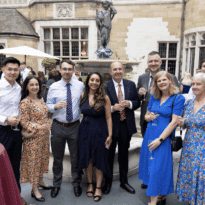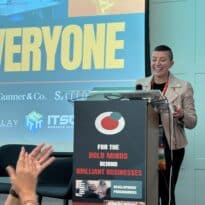In this latest Q&A from FundCalibre, they unpacks how overlooked companies and unloved markets can offer attractive returns, why technical analysis and timing matter, and the risks of following the crowd into overcrowded trades. Sean Peche, manager of the Ranmore Global Equity fund, tells us how market cycles, crises, and hype – from the Magnificent 7 to artificial intelligence – can present both risks and opportunities for patient investors. With real-world examples, analogies, and lessons learned across 17 years of investing, this interview provides practical insight into how disciplined, contrarian thinking can help protect capital and compound wealth over the long term.
Why you should listen to the interview: If you’re concerned about market hype, overvalued sectors, or simply want to understand how to find genuine opportunities in neglected areas, this interview is for you. It blends practical investing wisdom with real-world stories, equipping listeners with a mindset for navigating uncertainty while uncovering hidden gems.
This interview was recorded on 2 September 2025. Please note, answers are edited and condensed for clarity. To gain a fuller understanding and clearer context, please listen to the full interview.
Interview highlights:
Finding “Diamonds in the Dust”
“What value means to us is buying something for what we think is less than it’s worth. And of course no fund manager out there is saying what we do is we buy companies for more than they’re worth. But but in the words of the late Sir John Templeton, you can’t buy something that is popular and do well over the long term. And so we’re looking for the diamonds in the dust.
“Here’s an interesting analogy: if you take property, if you’re going to buy a property from a developer who’s in the industry, they’re going to squeeze every last dollar out of the selling price of that property. And so that means if you pay a high price, you are going to get a low return when you eventually sell that property.
“Many years ago, I met a guy, this was in 2001 or so, and he told me he was an invested in property. And I said, well, how do you make any money at these low yields? And he said, what he does is he buys properties on auction where the auction is scheduled for a Sunday afternoon when it’s raining. And I said, well, why on earth you doing that? And he said, well, because no one wants to be there. It’s the weekend, it’s after lunch. People have had a few pints down at the pub. It’s raining, it means there’s no competition. And he was buying.
“I asked what kind of yields are you getting? And he was buying these properties on 30% yields. Everybody else is buying properties from the developers at 2% and 3%, and here the guy is going where other people don’t want to go. And because of that getting a great deal. And that’s what we look for – a great deal.”
Why owning what everyone owns is dangerous
“There does seem to be a little disconnect and I think there’s some reasons to be concerned and some reasons to be cautious. And perhaps at the moment the rising bond yields around the world are a concern.
“Because of quantitative easing after the global financial crisis, the price of money was very low. And so you had huge amounts of speculation. You had asset prices, many of these top companies going to crazy levels. That’s why you had the likes of Peloton and Beyond Meat and all these kinds of speculative companies getting up to crazy levels and now falling 95% or whatever it is. But now the price of money’s getting more expensive.
“So I think we’ve got to be careful and look harder; that’s good for us – every crisis yields opportunities. When we had the tariff concerns in April and a lot of stocks fell, we sell when we think prices are full and we were selling in late March and we were buying when they were down 25%. And compounding like that makes a difference over time.
“The one problem in a crisis is that in a crisis, people sell what they own. And right now everybody owns the same things. They all own the Mag7 and everyone seems to own Bitcoin. They all own the large caps, they all own S&P 500 ETFs. And that’s a concern. So when one of these risks comes to pass, the challenge is if you own the same stuff that everybody else owns, you’re gonna get caught in the rush for the exits.”
AI hype and being careful
“I think AI’s over hyped and I’ll tell you why. The common thing when you speak to people is they go, well AI’s going to change the world. But rail travel changed the world. Air travel changed the world. And guess what? There’s still only two really. Air travel is a duopoly, it’s Boeing and Airbus. Well, you didn’t want to own those companies for the last 50 years, really? So the problem is there are many examples in history where things have changed the world.
“So how on earth are Open AI going to get an economic return from all the spend or any of these companies? They’re gonna have to charge more. What’s the problem? The problem is there’s lots of competitors. As soon as ChatGPT puts up the price, we’re gonna move to Perplexity. As soon as Perplexity puts up the price, we’re gonna move to Claude and then we’re gonna move to Grock. There’s just too many competitors. So that’s the first thing.
“The second thing is, if you look back at the tech companies in the early days you had Amazon doing online shopping and then cloud. You had Google doing search and advertising. You had Meta doing the social media and advertising. You had Microsoft doing enterprise. They all had their own little areas. Then some of them started to morph into the other areas. So you had Alphabet or Google starting cloud, competing with Microsoft and Amazon. You had Microsoft buying LinkedIn and starting to do a little bit of social media. You had Amazon starting to advertise, moving into Google’s domain. They’re trying to eat each others’ dinner. And now they’re all in AI, every single one of them. And they’re all ‘winner-takes-all, we all got to spend’. It’s not gonna be pretty. So we gotta be very careful about that.”
Conclusion: This conversation highlights the power of patience, discipline, and independent thinking in global equity investing. By avoiding the herd and seeking value where others aren’t looking, long-term wealth compounding becomes possible, even in volatile markets.
Main imge: pawel-czerwinski-eybM9n4yrpE-unsplash

































